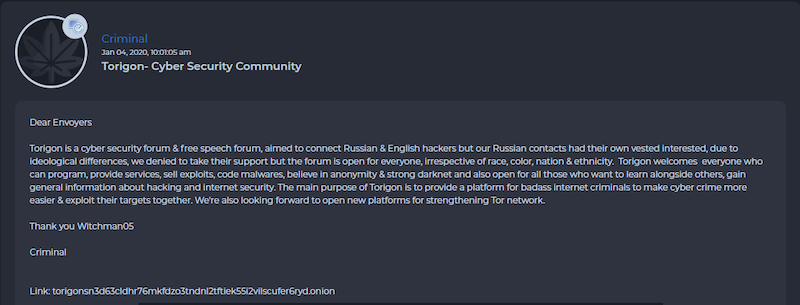
Why Did the “Torigon” Dark Web Forum Fail so Hard?
- The Torigon came into an explosive existence and quickly vanished through abandonment.
- The creators of the new platform did everything wrong, ignoring all key elements of success in this field.
- Torigon is an example of how things work in the dark web and the amount of work required to keep a successful platform up.
“Torigon” was a new English-speaking cybercrime forum that entered the dark web scene with impetus in October 2019. The fact that it no longer exists serves as an exemplary case of how the field works. Digital Shadows dives deeper into the specifics of the “whys” and “hows,” trying to decode the dark web's self-regulatory character, which determines who gets to stay, who is quickly devalued, and who gets ostracized from the cybercrime community. This is particularly complicated for dark web platforms that have to deal with DDoS attacks and various other inter-playing factors.
Almost from the very start of Torigon's operation, the platform was listed on “dark.fail” as a rising force in the field. In addition to this, Torigon partnered with the Envoy community to help draw people in quickly. Soon, about 650 users registered as members on Torigon, enjoying a clean and contemporary design, and prospecting on the promise of something qualitatively different. After a couple of months, the forum’s development stalled, no new subscribers were interested in joining in, and the forums went completely silent. The admins tried to convince people that the platform was still alive by posting on Torum and Envoy, but this wasn’t enough to reignite any interest.
Source: Digital Shadows
Digital Shadows believes that this failure was a combination of factors. First, the lack of user traffic is the biggest problem a forum of this kind has to deal with. A large audience means having many offerings, buyers, discussions, guides, etc. Having 650 users is nowhere nearly enough to be in a position to sustain economic and information exchange activity. One cause of this could be the “Russian factor” that all English-speaking forums have to face during their humble beginnings. Russians are a big portion of the cybercrime scene, and they prefer to use Russian-speaking forums, both for ideological reasons and because of the language barrier. That said, starting strong is critical, and Torigon's start wasn't that mighty.
Source: Digital Shadows
And then there was the lack of investment in DDoS protection that resulted in down-times since the very beginning. Torigon users, as well as prospective members, saw this as an indication that they couldn’t trust the platform. This is directly linked with the law enforcement factor that is involved in the equation of the success of a dark web project. Convincing users that they can trust the platform with their data against the FBI and the Europol needs time, devotion, consistency, and coverage of all financial burdens to achieve. Torigon’s admins may have realized all that along the way when they were already overwhelmed by having to maintain a big project for little or no reward.











